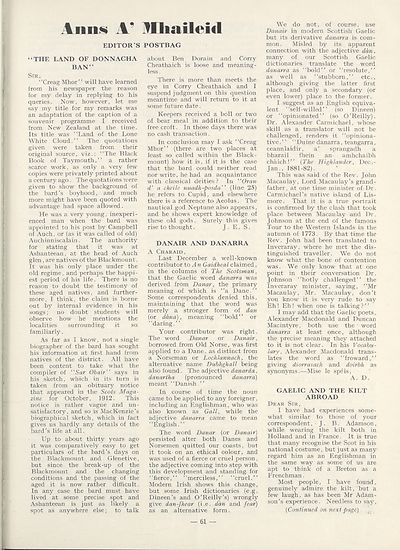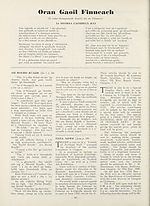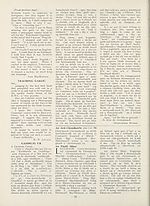An Comunn Gàidhealach Publications > Gaidheal > Volumes 44--45, January 1949--December 1950
(373) Page 61
Download files
Complete book:
Individual page:
Thumbnail gallery: Grid view | List view

Aim* A* 7IIiailoi«l
EDITOR'S POSTBAG
“THE LAND OF DONNACHA
BAN”
Sir,
‘‘Creag Mhor” will have learned
from his newspaper the reason
for my delay in replying to his
queries. Now, however, let me
say my title for my remarks was
an adaptation of the caption of a
souvenir programme I received
from New Zealand at the time.
Its title was ‘‘Land of the Lone
White Cloud . ’ ’ The quotations
given were taken from their
original source, viz.: ‘‘The Black
Book of Taymouth,” a rather
scarce work, as only a very few
copies were privately printed about
a century ago. The quotations were
given to show the background of
the bard’s boyhood, and much
more might have been quoted with
advantage had space allowed.
He was a very young, inexperi¬
enced man when the bard was
appointed to his post by Campbell
of Auch, or (as it was called of old)
Auchinniscalain. The authority
for stating that it was at
Ashanteean, at the head of Auch
glen, are natives of the Blackmount.
It was his only place under the
old regime, and perhaps the happi¬
est period of his life. There is no
reason to doubt the testimony of
these aged natives, and further¬
more, I think, the claim is borne
out by internal evidence in his
songs; no doubt students will
observe how he mentions the
localities surrounding it so
familiarly.
As far as I know, not a single
biographer of the bard has sought
his information at first hand from
natives of the district. All have
been content to take what the
compiler of “Sar Obair” says in
his sketch, which in its turn is
taken from an obituary notice
that appeared in the Scots Maga¬
zine for October, 1912. This
notice is rather vague and un-
satisfactory, and so is MacKenzie’s
biographical sketch, which in fact
gives us hardly any details of the
bard’s life at all.
Up to about thirty years ago
it was comparatively easy to get
particulars of the bard’s days on
the Blackmount and Glenetive,
but since the break-up of the
Blackmount and the changing
conditions and the passing of the
aged it is now rather difficult.
In any case the bard must have
lived at some precise spot and
Ashanteean is just as likely a
spot as anywhere else; to talk
about Ben Dorain and Corry
Cheathaich is loose and meaning¬
less.
There is more than meets the
eye in Corry Cheathaich and I
suspend judgment on this question
meantime and will return to it at
some future date.
Keepers received a boll or two
of bear meal in addition to their
free croft. In those days there was
no cash transaction.
In conclusion may I ask ‘‘Creag
Mhor” (there are two places at
least so called within the Black¬
mount) how it is, if it is the case
that the bard could neither read
nor write, he had an acquaintance
with classical deities? In “Oran
d' a cheile nuadh-posda” (line 25)
he refers to Cupid, and elsewhere
there is a reference to Aeolus. The
nautical god Neptune also appears,
and he shows expert knowledge of
these old gods. Surely this gives
rise to thought. J . E. S .
DANAIR AND DANARRA
A Charaid,
Last December a well-known
contributor to An Gaidheal claimed,
in the columns of The Scotsman,
that the Gaelic word danarra was
derived from Danar, the primary
meaning of which is ‘ ‘a Dane. ’ ’
Some correspondents denied this,
maintaining that the word was
merely a stronger form of dan
(or ddna), meaning ‘‘bold” or
‘ ‘daring. ’ ’
Your contributor was right.
The word Danar or Danair,
borrowed from Old Norse, was first
applied to a Dane, as distinct from
a Norseman or Lochlannach, the
alternative name Dubhghall being
also found. The adjective danar da,
danartha (pronounced danarra)
meant ‘‘Danish.”
In course of time the noun
came to be applied to any foreigner,
including an Englishman, who was
also known as Gall, while the
adjective danarra came to mean
‘‘English.”
The word Danar (or Danair)
persisted after both Danes and
Norsemen quitted our coasts, but
it took-on an ethical colour, and
was used of a fierce or cruel person,
the adjective coming into step with
this development and standing for
‘‘fierce,” ‘‘merciless,” ‘‘cruel.”
Modern Irish shows this change,
but some Irish dictionaries (e.g.
Dineen’s and O’Reilly’s) wrongly
give dan-fhear (i.e. dan and fear)
as an alternative form.
We do not, of course, use
Danair in modern Scottish Gaelic
but its derivative danarra is com¬
mon. Misled by its apparent
connection with the adjective dan,
many of our Scottish Gaelic
dictionaries translate the word
danarra as ‘‘bold” or ‘‘resolute,”
as well as "stubborn,” etc.,
although giving the latter first
place, and only a secondary (or
even lower) place to the former.
I suggest as an English equiva¬
lent "self-willed” (so Dineen)
or "opinionated” (so O’Reilly).
Dr. Alexander Carmichael, whose
skill as a translator will not be
challenged, renders it “opiniona-
tive. ” “ Du ine danarra, teangarra,
ceannlaidir, a’ sprangadh a
bharail fhein an amhchaibh
chkich! ’ ’ [The Highlander, Dec.-
Jan., 1881-82).
This was said of the Rev. John
Macaulay, Lord Macaulay’s grand¬
father, at one time minister of Dr.
Carmichael’s native island of Lis-
more. That it is a true portrait
is confirmed by the clash that took
place between Macaulay and Dr.
Johnson at the end of the famous
Tour to the Western Islands in the
autumn of 1773. By that time the
Rev. John had been translated to
Inveraray, where he met the dis¬
tinguished traveller. We do not
know what the bone of contention
was. We only know that at one
point in their conversation Dr.
Johnson “hotly challenged” the
Inveraray minister, saying, “Mr
Macaulay, Mr. Macaulay, don’t
you know it is very rude to say
Eh! Eh! when one is talking ? ’ ’
I may add that the Gaelic poets,
Alexander Macdonald and Duncan
Macintyre, both use the word
danarra at least once, although
the precise meaning they attached
to it is not clear. In his Vocabu¬
lary, Alexander Macdonald trans¬
lates the word as “froward,”
giving diorrasach and doirbh as
synonyms.—Mise le speis,
A. D.
GAELIC AND THE KILT
ABROAD
Dear Sir,
I have had experiences some¬
what similar to those of your
correspondent, • J . B. Adamson ,
while wearing the kilt both in
Holland and in France. It is true
that many recognise the Scot in his
national costume, but just as many
regard him as an Englishman in
the same way as some of us are
apt to think of a Breton as a
Frenchman.
Most people, I have found,
genuinely admire the kilt, but a
few laugh, as has been Mr Adam¬
son’s experience. Needless to say,
(Continued on next page) 1
— 61 —
EDITOR'S POSTBAG
“THE LAND OF DONNACHA
BAN”
Sir,
‘‘Creag Mhor” will have learned
from his newspaper the reason
for my delay in replying to his
queries. Now, however, let me
say my title for my remarks was
an adaptation of the caption of a
souvenir programme I received
from New Zealand at the time.
Its title was ‘‘Land of the Lone
White Cloud . ’ ’ The quotations
given were taken from their
original source, viz.: ‘‘The Black
Book of Taymouth,” a rather
scarce work, as only a very few
copies were privately printed about
a century ago. The quotations were
given to show the background of
the bard’s boyhood, and much
more might have been quoted with
advantage had space allowed.
He was a very young, inexperi¬
enced man when the bard was
appointed to his post by Campbell
of Auch, or (as it was called of old)
Auchinniscalain. The authority
for stating that it was at
Ashanteean, at the head of Auch
glen, are natives of the Blackmount.
It was his only place under the
old regime, and perhaps the happi¬
est period of his life. There is no
reason to doubt the testimony of
these aged natives, and further¬
more, I think, the claim is borne
out by internal evidence in his
songs; no doubt students will
observe how he mentions the
localities surrounding it so
familiarly.
As far as I know, not a single
biographer of the bard has sought
his information at first hand from
natives of the district. All have
been content to take what the
compiler of “Sar Obair” says in
his sketch, which in its turn is
taken from an obituary notice
that appeared in the Scots Maga¬
zine for October, 1912. This
notice is rather vague and un-
satisfactory, and so is MacKenzie’s
biographical sketch, which in fact
gives us hardly any details of the
bard’s life at all.
Up to about thirty years ago
it was comparatively easy to get
particulars of the bard’s days on
the Blackmount and Glenetive,
but since the break-up of the
Blackmount and the changing
conditions and the passing of the
aged it is now rather difficult.
In any case the bard must have
lived at some precise spot and
Ashanteean is just as likely a
spot as anywhere else; to talk
about Ben Dorain and Corry
Cheathaich is loose and meaning¬
less.
There is more than meets the
eye in Corry Cheathaich and I
suspend judgment on this question
meantime and will return to it at
some future date.
Keepers received a boll or two
of bear meal in addition to their
free croft. In those days there was
no cash transaction.
In conclusion may I ask ‘‘Creag
Mhor” (there are two places at
least so called within the Black¬
mount) how it is, if it is the case
that the bard could neither read
nor write, he had an acquaintance
with classical deities? In “Oran
d' a cheile nuadh-posda” (line 25)
he refers to Cupid, and elsewhere
there is a reference to Aeolus. The
nautical god Neptune also appears,
and he shows expert knowledge of
these old gods. Surely this gives
rise to thought. J . E. S .
DANAIR AND DANARRA
A Charaid,
Last December a well-known
contributor to An Gaidheal claimed,
in the columns of The Scotsman,
that the Gaelic word danarra was
derived from Danar, the primary
meaning of which is ‘ ‘a Dane. ’ ’
Some correspondents denied this,
maintaining that the word was
merely a stronger form of dan
(or ddna), meaning ‘‘bold” or
‘ ‘daring. ’ ’
Your contributor was right.
The word Danar or Danair,
borrowed from Old Norse, was first
applied to a Dane, as distinct from
a Norseman or Lochlannach, the
alternative name Dubhghall being
also found. The adjective danar da,
danartha (pronounced danarra)
meant ‘‘Danish.”
In course of time the noun
came to be applied to any foreigner,
including an Englishman, who was
also known as Gall, while the
adjective danarra came to mean
‘‘English.”
The word Danar (or Danair)
persisted after both Danes and
Norsemen quitted our coasts, but
it took-on an ethical colour, and
was used of a fierce or cruel person,
the adjective coming into step with
this development and standing for
‘‘fierce,” ‘‘merciless,” ‘‘cruel.”
Modern Irish shows this change,
but some Irish dictionaries (e.g.
Dineen’s and O’Reilly’s) wrongly
give dan-fhear (i.e. dan and fear)
as an alternative form.
We do not, of course, use
Danair in modern Scottish Gaelic
but its derivative danarra is com¬
mon. Misled by its apparent
connection with the adjective dan,
many of our Scottish Gaelic
dictionaries translate the word
danarra as ‘‘bold” or ‘‘resolute,”
as well as "stubborn,” etc.,
although giving the latter first
place, and only a secondary (or
even lower) place to the former.
I suggest as an English equiva¬
lent "self-willed” (so Dineen)
or "opinionated” (so O’Reilly).
Dr. Alexander Carmichael, whose
skill as a translator will not be
challenged, renders it “opiniona-
tive. ” “ Du ine danarra, teangarra,
ceannlaidir, a’ sprangadh a
bharail fhein an amhchaibh
chkich! ’ ’ [The Highlander, Dec.-
Jan., 1881-82).
This was said of the Rev. John
Macaulay, Lord Macaulay’s grand¬
father, at one time minister of Dr.
Carmichael’s native island of Lis-
more. That it is a true portrait
is confirmed by the clash that took
place between Macaulay and Dr.
Johnson at the end of the famous
Tour to the Western Islands in the
autumn of 1773. By that time the
Rev. John had been translated to
Inveraray, where he met the dis¬
tinguished traveller. We do not
know what the bone of contention
was. We only know that at one
point in their conversation Dr.
Johnson “hotly challenged” the
Inveraray minister, saying, “Mr
Macaulay, Mr. Macaulay, don’t
you know it is very rude to say
Eh! Eh! when one is talking ? ’ ’
I may add that the Gaelic poets,
Alexander Macdonald and Duncan
Macintyre, both use the word
danarra at least once, although
the precise meaning they attached
to it is not clear. In his Vocabu¬
lary, Alexander Macdonald trans¬
lates the word as “froward,”
giving diorrasach and doirbh as
synonyms.—Mise le speis,
A. D.
GAELIC AND THE KILT
ABROAD
Dear Sir,
I have had experiences some¬
what similar to those of your
correspondent, • J . B. Adamson ,
while wearing the kilt both in
Holland and in France. It is true
that many recognise the Scot in his
national costume, but just as many
regard him as an Englishman in
the same way as some of us are
apt to think of a Breton as a
Frenchman.
Most people, I have found,
genuinely admire the kilt, but a
few laugh, as has been Mr Adam¬
son’s experience. Needless to say,
(Continued on next page) 1
— 61 —
Set display mode to:
![]() Universal Viewer |
Universal Viewer | ![]() Mirador |
Large image | Transcription
Mirador |
Large image | Transcription
| An Comunn Gàidhealach > An Comunn Gàidhealach Publications > Gaidheal > Volumes 44--45, January 1949--December 1950 > (373) Page 61 |
|---|
| Permanent URL | https://digital.nls.uk/127126512 |
|---|
| Description | This contains items published by An Comunn, which are not specifically Mòd-related. It includes journals, annual reports and corporate documents, policy statements, educational resources and published plays and literature. It is arranged alphabetically by title. |
|---|
| Description | A collection of over 400 items published by An Comunn Gàidhealach, the organisation which promotes Gaelic language and culture and organises the Royal National Mòd. Dating from 1891 up to the present day, the collection includes journals and newspapers, annual reports, educational materials, national Mòd programmes, published Mòd literature and music. |
|---|---|
| Additional NLS resources: |
|

